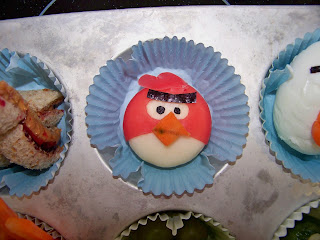When I wrote my first post regarding our real food journey, I noted that I would soon be including a list of our goals and changes that we want to make. I have sat down several times to make this list but never finished it. So, I decided that I would take a different approach to it. The Weston A. Price Foundation has two lists that I am basing pretty much all of our dietary changes on, so rather than sit here and try to make up my own lists, I will instead include the Weston A. Price lists here along with a brief explanation of how we are doing or plan to incorporate each one into our lives. I'm breaking this into two posts since the lists are a bit lengthy.
Dietary Guidelines
1. Eat whole, natural foods.
This is still a work in progress for us. While we do eat mostly whole, natural foods, we do still have a few processed foods that we continue to use (mostly snack items). This is an organizational issue for me. I need to better plan my days to allow for snack food preparations as well as regular meal prep.
2. Eat only foods that will spoil, but eat them before they do.
This is also a work in progress as there are still a few items we use which are convenience or processed foods.
3. Eat naturally-raised meat including fish, seafood, poultry, beef, lamb, game, organ meats and eggs.
We haven't been able to fully do this yet because of the cost but we have stopped buying grocery store meats that come from CAFO lots and have started buying locally raised meats and eggs. We also make sure to purchase fish & seafood that is wild caught and not farm raised.
4. Eat whole, naturally-produced milk products from pasture-fed cows, preferably raw and/or fermented, such as whole yogurt, cultured butter, whole cheeses and fresh and sour cream.
In June last year, we started buying raw milk from a local farm that pasture feeds their cows. Besides drinking the milk, we use the cream to make butter & sour cream, and the milk to make homemade cheese & yogurt. I also use the buttermilk for biscuits & other recipes and whey in recipes and for lacto-fermentation.
5. Use only traditional fats and oils including butter and other animal fats, extra virgin olive oil, expeller expressed sesame and flax oil and the tropical oils—coconut and palm.
We have completely eliminated industrial oils such as corn, soy & canola and have been using butter, coconut oil, olive oil, lard & tallow.
6. Eat fresh fruits and vegetables, preferably organic, in salads and soups, or lightly steamed.
We have been increasing the amount of produce we eat. Last spring, I planted my first organic garden and we enjoyed fresh produce from it all summer. I also preserved some of the produce we harvested for later use. We plan to plant a garden again this spring. We try to purchase organic produce as often as our budget allows, especially the items on the dirty dozen list.
7. Use whole grains and nuts that have been prepared by soaking, sprouting or sour leavening to neutralize phytic acid and other anti-nutrients.
This is a work in progress. I try to plan ahead so I can soak my grains & nuts but I frequently forget or end up changing my mind about something last minute and use unsoaked flours, grains, etc. This is also an organizational issue for me. I've also been trying to incorporate sourdough into our diet, but a few days after starting sourdough starter, it seems to die on me so I need to figure out what I'm doing wrong there.
8. Include enzyme-enhanced lacto-fermented vegetables, fruits, beverages and condiments in your diet on a regular basis.
We are doing pretty well with this - well, I am. I'm having a rough time getting the kids on board. I have started brewing my own kombucha and I've recently made sauerkraut (2 kinds) and lacto-fermented ginger carrots. I've also been making lacto-fermented lemonade punch and raw milk yogurt. Laural will drink the kombucha, eat yogurt and I can usually talk her into eating a little of the other stuff but Micah will have nothing to do with any of it except the yogurt. He will drink the store bought kefir I've brought home a few times but that isn't really all that ideal since it's pasteurized. One of my short term goals is to get some water & dairy kefir grains and start making that as well.
9. Prepare homemade meat stocks from the bones of chicken, beef, lamb or fish and use liberally in soups and sauces.
We are working on this one too. I have made bone broths on several occasions and we have started to drink it but it has been a little difficult for us to get down. We just aren't accustomed to it yet. We started doing really well with the broth a couple weeks ago and one night I used it to make the rice I was using in a stir fry. It tasted great and went over well. Even my picky Micah ate it! But later that night we all came down with a stomach bug and well, everything came up. After dealing with the undigested rice, the smell of the broth in crock pot made me sick so I made my husband dump it out. I haven't been able to start a new batch yet, but maybe soon.
10. Use herb teas and coffee substitutes in moderation.
We don't drink coffee and seldom drink tea but when we do it is usually organic & herbal.
11. Use filtered water for cooking and drinking.
We are hoping to get a Berkey filter later this year but for now we use water from our tap. I know it isn't fluoridated but I do believe there is chlorine added. All of the pitcher or faucet filters remove the chlorine taste & odor but don't appear to remove the actual chlorine. Not sure what that is all about really. I need to look into it more but until we can buy the Berkey, we will have to continue to use our tap.
12. Use unrefined Celtic sea salt and a variety of herbs and spices for food interest and appetite stimulation.
We currently use Real Salt and Celtic sea salt. I've been experimenting with Bragg seasonings and have always used plenty of herbs & spices.
13. Make your own salad dressing using raw vinegar, extra virgin olive oil and expeller expressed flax oil.
I've been making my own dressing for a while though I do still crave a particular brand of honey french dressing that is full of high fructose corn syrup & soy oil. I don't buy it but I miss it.
14. Use natural sweeteners in moderation, such as raw honey, maple syrup, dehydrated cane sugar juice and stevia powder.
We made the switch to local raw honey, local real maple syrup, organic sugar (occasionally) and stevia powder & liquid this past summer. I didn't realize how very yummy real maple syrup was! So much better that the maple flavored corn syrup!
15. Use only unpasteurized wine or beer in strict moderation with meals.
Not an issue for us as we don't like beer and rarely have wine.
16. Cook only in stainless steel, cast iron, glass or good quality enamel.
I used Christmas money to buy a new set of stainless steel cookware during the after Christmas sales. I threw away a bunch of my cheap & non-stick bake ware but still haven't decided what to do with my rather large set of aluminum cookware that was rather expensive and still in excellent condition. I hate to throw it away but don't want to give it away for someone else to use either.
17. Use only natural supplements.
Working on this one too. I am planning to start using fermented cod liver oil and other natural supplements but the cost can be a little prohibitive.
18. Get plenty of sleep, exercise and natural light.
This is a tough one because I'm just not a day person so I'm up late, don't get enough sleep and really don't start to function until evening. Exercise can be tough due to some physical issues I have. I don't have a game plan for this one yet.
19. Think positive thoughts and minimize stress.
I don't really have a lot of stress to begin with so that's not a problem. I do tend to be a worrier but I've been praying through that.
20. Practice forgiveness.
Another work in progress. That old human habit of holding a grudge can be so hard to get past sometimes!
Overall, we are doing pretty well with the guidelines. Some are easy changes, some not so easy and some can cost a bit more that we can afford, but we are taking things slowly and doing what we can with what we have. Even small changes can have a big impact on your health!
Tomorrow, I will post the Weston A. Price Foundation Dietary Dangers and how we are progressing with those. For more information on the Dietary Guidelines and Dangers, go to the Weston A. Price Foundation website.
















